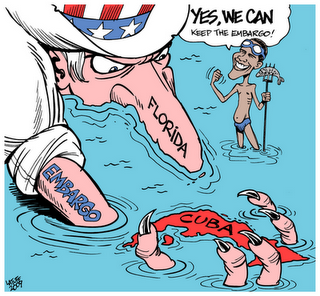
Maryland Representative Chris Van Hollen returned from Cuba with Alan Gross and a new US strategy of engagement with Cuba:
For over 50 years, US officials have tried to bring about positive change and reform in Cuba by attempting to isolate the island nation. It is clear that policy has been a miserable failure. Over the last five decades, the Castro brothers have outlasted over eight American presidents and very little has changed. The oft-cited definition of insanity is doing the same thing over and over and expecting a different result.
President Obama has now opened a new chapter in US Cuba relations, with a new policy better tailored to the 21st Century. President Obama's actions recognize that the best way to bring about positive change in Cuba is through more -- not less -- engagement with the island and its people. More travel, more trade, and more communication between the United States and Cuba will expose Cuba to the benefits of the free exchange of goods and ideas. Those in Cuba who want to limit individual freedom may fear this, but Americans, and those who want to expand freedom, should welcome it.
US Congressman Van Hollen says “I have had the good fortune of knowing Alan Gross since the early 2000s, and, ever since he was imprisoned in Cuba, his wife, Judy, has been tireless in seeking his release. It has been an honor to work with her and many of my colleagues in the Congress to set Alan free. And today, I had the privilege of accompanying Judy Gross, as well as Senator Leahy, Senator Flake, and Judy's very dedicated attorney, Scott Gilbert, on the flight to Cuba to bring Alan home. Alan Gross did not ask to shape history. He was unjustly swept up in the conflict between the U.S. and Cuba. But, in the end, Alan Gross proved to be a catalyst for change. After five years in a Cuban prison, Alan Gross is not only thrilled to be free, but also welcomes the new approach to Cuba and its people.”
According to the U.S. Chamber of Commerce, every year, the U.S. economy loses out on $1.2 billion in missed sales. The Cuban government says it misses out on $685 million each year because of the embargo.
Internet access in Cuba is censored and heavily restricted, with the costs being well above what most Cubans can afford. Just 5% of Cubans have unfiltered access to the Internet, according to Freedom House, a watchdog group. Meanwhile, in Miami, New Jersey and elsewhere many Cuban-Americans are criticizing Obama's actions, while Republicans and Democrats are echoing similar comments.